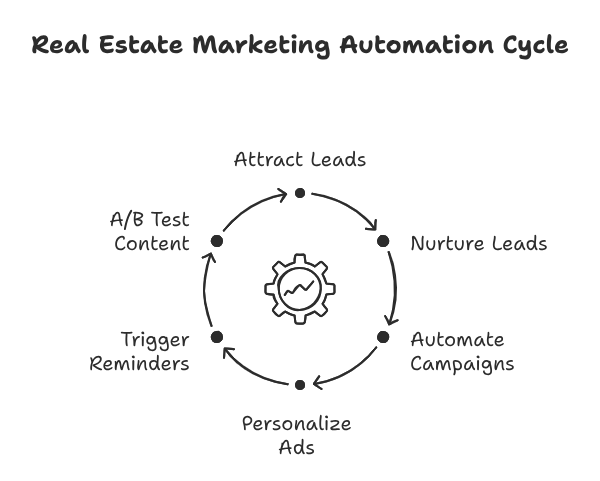Technology is reshaping every corner of the business world, and real estate is no exception. As the industry becomes more competitive and data-driven, AI in real estate is empowering agents to gain an edge—helping them close more deals with greater speed and precision.
In 2025, successful agents are no longer relying solely on intuition or word-of-mouth marketing. Instead, they’re embracing AI tools for real estate agents to uncover leads, automate tasks, analyze buyer behavior, and create a better client experience from start to finish.
Here’s how real estate agents are using AI to stay ahead of the curve and grow their businesses faster than ever before.
What is AI in Real Estate?
Artificial Intelligence (AI) refers to technology that can mimic human thinking—learning from data, making predictions, and automating tasks. In the real estate world, AI is being used to:
- Find and score high-quality leads
- Predict when a homeowner may list their property
- Create virtual property tours
- Stage homes digitally
- Automate follow-ups and marketing messages
- Analyze market data for pricing insights
From saving time to increasing accuracy, real estate automation with AI allows agents to focus more on human connections and less on repetitive tasks.
1. AI for Real Estate Lead Generation
Finding clients used to involve cold calls, networking events, or door knocking. Now, AI can identify potential buyers or sellers before they even reach out.
Platforms like Revaluate, SmartZip, and Zillow Premier Agent use predictive analytics in real estate to:
- Detect people who are likely to move within 3–12 months
- Score leads based on behavior and likelihood to transact
- Help agents prioritize outreach to warm leads
This targeted approach reduces time spent chasing dead ends and increases the likelihood of closing deals faster.
2. Smarter CRMs for Real Estate Agents
Managing relationships is the core of real estate success, and today’s AI-powered CRMs make that easier than ever.
Tools like Follow Up Boss, LionDesk, and Chime use AI-powered CRM for real estate to:
- Automatically track client interactions
- Suggest the best times to follow up
- Send automated texts or emails based on client activity
- Remind agents of important dates or missed conversations
This intelligent workflow ensures that agents stay top of mind with prospects and never miss an opportunity to follow up—boosting conversions and client satisfaction.
3. Predictive Analytics in Real Estate
One of the biggest advantages of AI in real estate is its ability to see into the future. With predictive analytics, agents can anticipate market trends and client behavior with remarkable accuracy.
For example, tools like Likely.AI and CoreLogic help agents:
- Predict which homeowners are likely to sell
- Spot upcoming hot neighborhoods
- Evaluate optimal pricing strategies
- Forecast buyer demand for specific property types
With this data-driven insight, agents can act strategically, getting ahead of the competition and offering clients more precise guidance.
4. Real Estate Marketing Automation
Marketing plays a key role in attracting and nurturing leads. But crafting campaigns manually takes time. That’s where real estate marketing automation comes in.
Platforms like kvCORE, BoomTown, and OutreachPlus help agents automate marketing efforts by:

- Sending behavior-based email and SMS campaigns
- Running personalized Facebook and Google Ads
- Triggering reminders when leads revisit property listings
- A/B testing content to increase engagement
These tools free up valuable time while keeping your brand visible and relevant—even while you’re out showing homes or closing deals.
5. Virtual Staging and AI-Enhanced Property Listings
First impressions matter. With more buyers starting their journey online, listings need to look amazing. AI makes it easier than ever to create stunning visuals.
Using tools like BoxBrownie, Virtual Stager, and Styldod, agents can:
- Digitally stage empty or outdated rooms
- Replace gloomy skies with blue ones
- Add furniture and lighting effects
- Generate 3D walkthroughs and interactive floor plans
This visual appeal increases buyer interest and helps listings sell faster—without the time or cost of traditional staging.
6. AI Chatbots: 24/7 Lead Nurturing
Client inquiries can come at any time—day or night. With AI chatbots like Structurely or Tidio, agents can:
- Instantly respond to inquiries via website or SMS
- Qualify leads based on buying intent
- Book appointments automatically
- Send follow-up messages without delay
This real estate automation keeps your pipeline moving even when you’re unavailable, ensuring no opportunity is lost.
Why AI Won’t Replace Agents—It Will Empower Them
There’s often concern that technology might replace human professionals. But the reality is quite the opposite. AI in real estate isn’t about replacing agents—it’s about augmenting their abilities.
Agents still provide the empathy, local expertise, negotiation skills, and strategic thinking that clients trust. AI simply:
- Handles repetitive or time-consuming tasks
- Offers faster access to insights
- Enhances customer service
- Helps scale personalized communication
Together, this means more deals closed in less time—with less stress.
Final Thoughts: The Future of Real Estate Is AI-Driven
As technology continues to evolve, it’s clear that AI in Real Estate agents are better equipped to meet today’s client expectations.
By leveraging AI for:
✅ Lead generation
✅ Marketing automation
✅ Predictive analytics
✅ CRM enhancement
✅ Virtual property marketing
…you position yourself not only to survive in a competitive market—but to thrive and scale your success.

